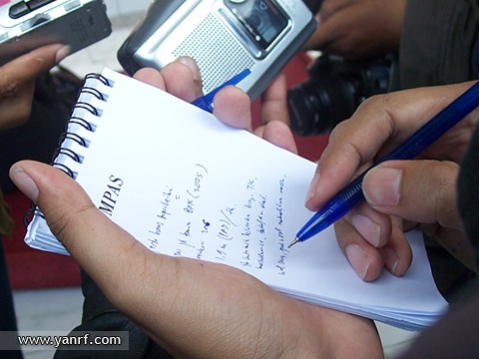Requiem for a journalist
Yesterday, I received an email from Lise Olsen, an investigative reporter at the Houston Chronicle [via the GIJN’s listserv]. In it, she implored the global community of investigative reporters to take action following news that one of our own was murdered in Mexico.
An excerpt:
“So it is really important for us AS A COMMUNITY OF INVESTIGATIVE REPORTERS to react strongly to the news this week of an assasination of a young online editor in Mexico [Jaime Guadalupe González Domínguez] – who lived minutes from America – and of yet another armed attack on El Siglo de Torreon, one of the most important and few remaining strong voices for press freedom in Northeast Mexico, which has been devasted by violence.”
Every time I tweet news like this, I say “It could happen to any of us.” Really, what I’m thinking is it could happen to me. And I know others are thinking the same thing. Read More…
Picking the right stories to investigate

Robin Hood (from the Disney version of the story). Credit: Dorian http://doriansly.deviantart.com/
I recently came across an old post I wrote about stories I was working on. It was an interesting read because, in the 12 months since, three haven’t materialised (the fourth story is being published soon).
Why did they disappear off my radar? I know it wasn’t because I followed them up and they all led to dead ends. I plan to return to at least one in the future. Still, I questioned myself about why I didn’t put more effort into pursuing them.
Figuring out what motivates you to be your best
In the early days of The Muckraker, I didn’t know what motivated me as a reporter. I just knew that, since the start of my career, certain stories turned me into a workaholic monster. I’d become so obsessed that I’d work all night, eat little and generally never switch off. I’d start working at 10pm; the next time I glanced at the clock, it would be 4am.
These stories had two common themes: 1) Injustice and 2) A need for someone to right the wrong.
Why do these stories motivate me? I ended up having this conversation with Farset Labs co-founder (and my friend) Bolster. He summed it up best:
“Growing up, you felt like you got screwed over, that there was a lot of injustice. So now, whenever you see injustice, you try and fix it. You’re kinda like Robin Hood without the tights, except you can’t fire a bow and arrow for shit.”
Are your sources lying to you?

From Yan Arief: http://www.flickr.com/photos/yanrf/
As most of you know, I’m working on a story that’s thirty years old. For the past six months, it’s consumed me. When I’m not doing my day job, I’m working on it. It’s about a man who was wronged for trying to do the right thing (we’ll call him Thomas).
When I first started my research, I came across a story another reporter had written about Thomas (we’ll call the reporter Jack). In it, Jack made allegations about the circumstances surrounding Thomas’s death. I was confused. It contradicted everything sources had told me as well as the little evidence I’d gathered.
Still, Jack had 20 or more years experience on me. I gave him the benefit of the doubt; I’d find the truth out sooner or later. It wasn’t critical to that stage of my research.
Yet the more information I gathered, the more it rankled with me. Jack’s story just didn’t add up.
Two weeks ago, while searching through newspaper archives, I found Jack’s story – published 25 years earlier. It didn’t have a byline on it but it had obviously circulated the news twice. Read More…
How to be an investigative reporter and feed yourself at the same time (is the question)
“The fault I find with most American newspapers is not the absence of dissent. It is the absence of news. With a dozen or so honorable exceptions, most American newspapers carry very little news.Their main concern is advertising….Most owners of newspapers are businessmen, not newspapermen. The news is something which fills the spaces left over by the advertisers.” – I.F. Stone, American investigative journalist.
If you want to become an investigative journalist in the digital age, what do you do? Do you join a newspaper and build up a beat, stealing time during the day to work on your own projects? Or do you launch your own publication?
This was the question I was faced with at 19. I’d spent the previous two years working on investigative stories, pitching them to newspaper editors. They were rarely published. In-house lawyers or the paper’s ad sales department wouldn’t let the copy run (so the editor said).
One time, a story I submitted about ambulances failing to respond to 999 calls quickly was spiked in favour of a Department of Health press release about how new vehicles were being added to the ambulance fleet (none of them were for emergency use).
If the story was about a government department (which it often was), the Editor worried that it could upset their “sources” inside the dept in question. [Note to younger hacks: If an “inside” source gets upset at you for writing a negative story about their employer, they’re not really a source but a PR flack trying to control the flow of information].
Here’s the thing: my stories weren’t based on anonymous sources. Or any sources at all, for that matter. I was a teenager who looked and sounded like a twelve year old; sources wouldn’t talk to me. So I developed a skill for digging out public records. All of my stories were based on paper trails and documents. Every fact could be verified. Read More…

